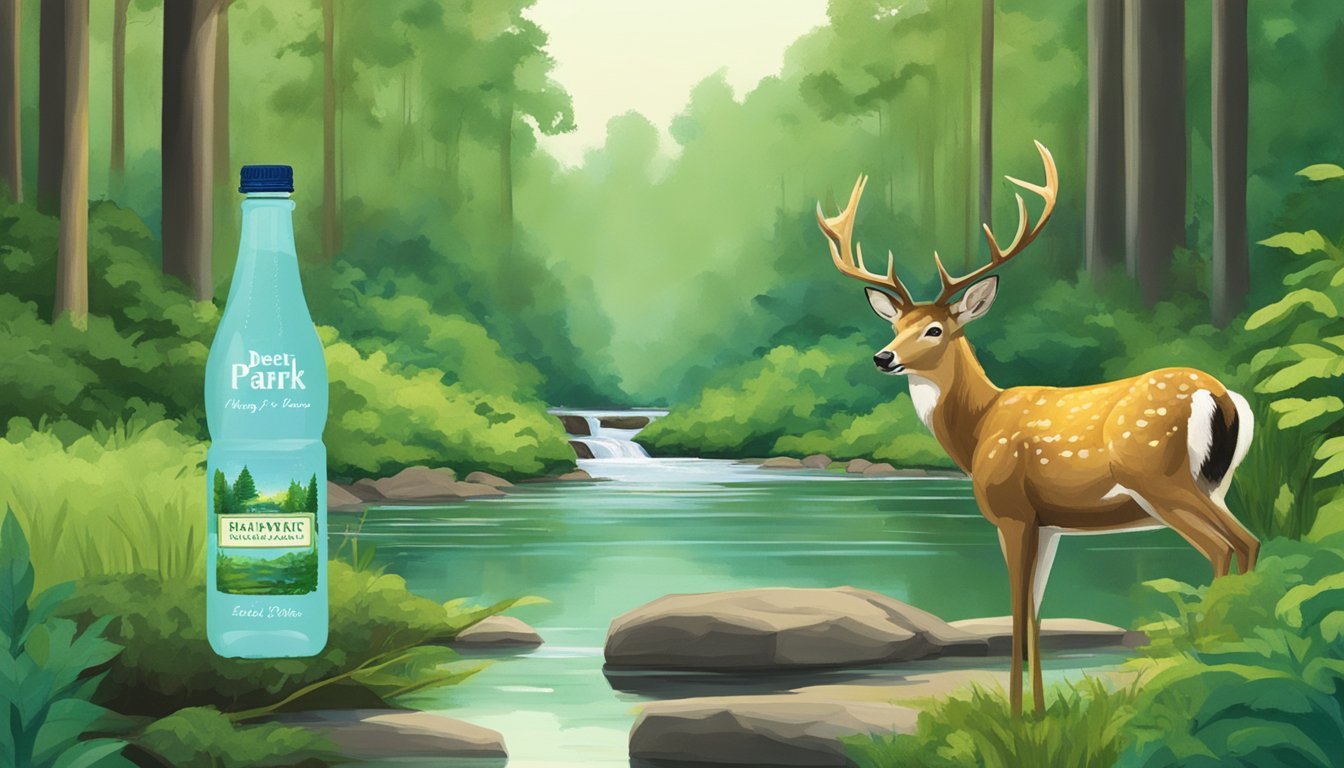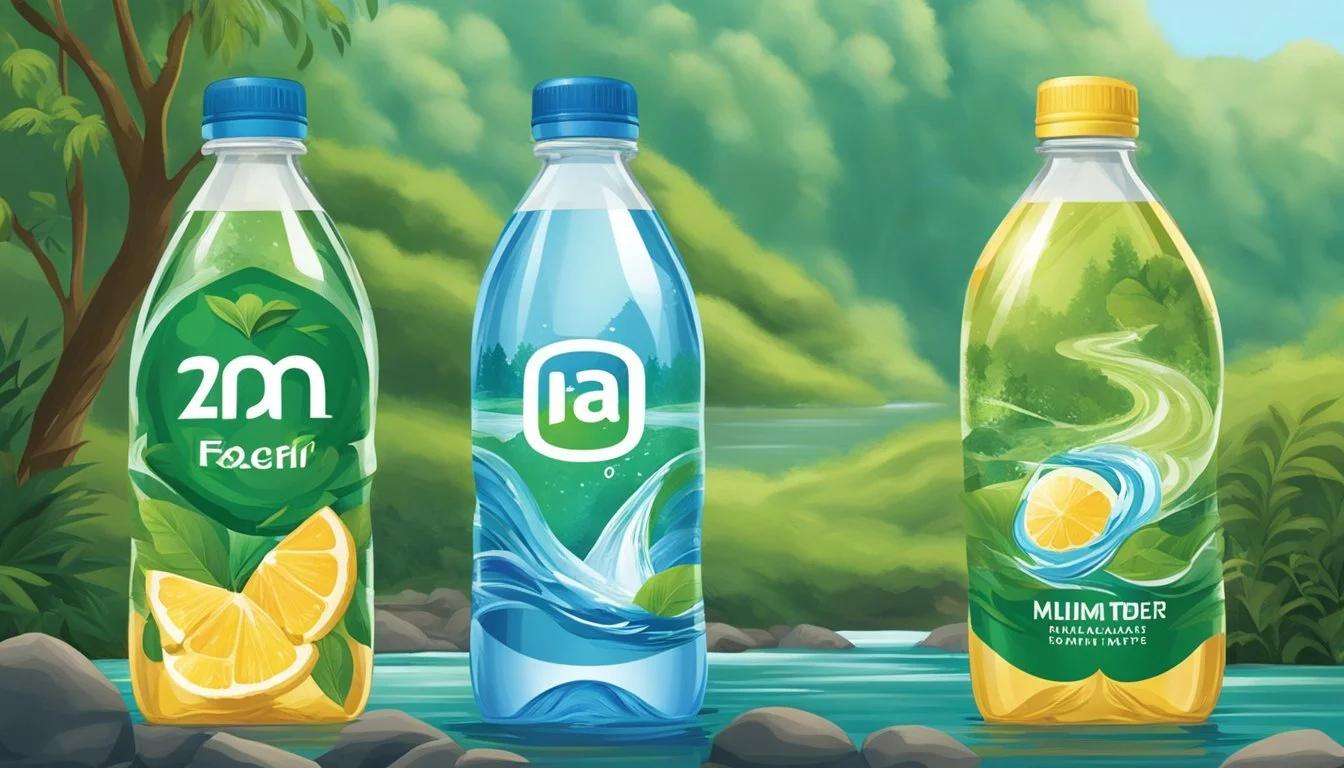Deer Park vs. Richard’s Rainwater
A Comprehensive Bottled Water Comparison
In the world of bottled water, choosing between Deer Park and Richard’s Rainwater boils down to the source and processing methods of each brand. Deer Park, a longstanding favorite, touts its 100% natural spring water sourced from various springs along the Eastern Seaboard. This brand is well-known for its crisp, clean taste, appealing to those who prefer a straightforward option straight from nature.
Richard’s Rainwater, on the other hand, offers a unique approach by capturing rainwater and purifying it, ensuring a fresh and natural taste that is both innovative and eco-friendly. This method sets it apart from more traditional spring water brands by emphasizing sustainability and purity.
When comparing Deer Park and Richard’s Rainwater, both have distinct advantages, but Richard’s Rainwater's commitment to sustainability and innovative purification process provides a compelling edge in the battle of bottled water. Readers will find this comparison illuminating as they navigate their preferences for taste, source, and environmental impact.
The Essence of Bottled Water
Bottled water is a common choice for many who seek clean, pure water readily available. It comes in various forms, each promising distinct qualities and benefits.
Drinking water in bottled form is often sourced from springs, wells, or purified municipal supplies. Companies like Deer Park and Richard’s Rainwater emphasize their unique sources and processes to attract consumers.
Deer Park prides itself on being 100% natural spring water, sourced from various springs along the Eastern Seaboard. This gives it a crisp taste that many find refreshing.
Richard’s Rainwater, on the other hand, is harvested rainwater, offering a unique appeal. This method captures naturally pure water before it touches the ground.
Clean water is essential for health, and bottled water brands promise a reliable source. Whether it's spring water or rainwater, the goal remains the same: to provide fresh, safe, and convenient drinking water.
Packaged water must meet stringent standards to ensure it's free from contaminants. This includes regular testing and adherence to industry regulations.
Using lists or tables, consumers can compare the specifics:
Brand Source Notable Features Deer Park Natural Springs Crisp taste, multiple sources Richard's Rainwater Harvested Rainwater Naturally pure, unique method
With bottled water, the emphasis on purity and cleanliness underscores the importance of safe hydration.
Understanding Deer Park Water
Deer Park is known for its natural spring water sourced from multiple locations along the Eastern Seaboard of the United States. This section highlights the origin, filtration process, packaging options, and taste profile of Deer Park water.
Origin and Source
Deer Park sources its water from various springs situated along the Eastern Seaboard, including states like Pennsylvania and Maryland. One notable spring is located in Kiln, Mississippi. The company prides itself on utilizing natural spring water, which is often highlighted in its branding.
Deer Park's water comes from natural springs, which are underground water sources flowing to the surface. These springs are selected for their high quality and natural cleanliness, ensuring a reliable source of pure water.
Filtration and Purity
Deer Park employs a rigorous filtration process to ensure the purity of its water. Though the water is naturally clean, it undergoes additional purification steps to remove any potential contaminants. This process includes micro-filtration and ultraviolet (UV) light treatment.
The company adheres to strict quality control measures to ensure that the water meets health and safety standards. As a result, Deer Park water consistently tests below the levels of contaminants set by regulatory bodies.
Packaging
Deer Park offers its water in various packaging options, including plastic bottles and recyclable aluminum cans. The plastic bottles are made from PET, a lightweight and recyclable material, minimizing the environmental impact.
The company emphasizes sustainability, encouraging consumers to recycle their bottles and opting for recyclable materials whenever possible. The packaging is designed to be functional and convenient for a variety of lifestyles, whether for on-the-go hydration or at-home consumption.
Tasting Notes
Deer Park water is appreciated for its clean, crisp taste, which can be attributed to its natural spring sources. The water has a neutral pH, making it smooth on the palate. The taste is unadulterated by additional minerals or flavorings, providing a pure drinking experience.
Consumers often describe Deer Park water as refreshing and light, suitable for daily hydration needs. The use of natural spring sources helps maintain this consistent and appealing taste profile.
Delving into Richard’s Rainwater
Richard’s Rainwater offers a unique approach to bottled water, emphasizing sustainability and purity. They capture rain directly, ensuring a renewable source of clean water. Let’s explore their rainwater harvesting process, comprehensive filtration system, eco-friendly packaging, and the range of available flavors and variants.
Rainwater Harvesting Process
Richard’s Rainwater captures precipitation before it hits the ground. This method ensures the collection of one of the purest forms of water available. Richard Heinichen, the founder, started this innovative approach in central Texas.
Collecting rainwater helps prevent storm runoff, which can carry pollutants into urban areas. The company’s process involved collecting millions of gallons, effectively providing clean water without straining existing resources. This method is both sustainable and effective in addressing water scarcity issues.
Filtration and Safety
The water undergoes a rigorous, virtually zero-waste filtration system. This process ensures that Richard’s Rainwater remains chlorine-free and potable.
The proprietary filtration system makes the water safe for consumption by removing any impurities that may have been collected alongside the rainwater. The emphasis on safety and purity places Richard’s Rainwater among the few bottled water brands that prioritize health without compromising the environment.
Eco-Friendly Packaging
Richard’s Rainwater uses both glass bottles and eco-friendly packaging materials, ensuring minimal environmental impact. Glass bottles are notable for being reusable and recyclable, reducing waste compared to traditional plastic bottles.
Additionally, the company’s packaging strategy plays a crucial role in their sustainability mission. By opting for materials that have less environmental impact, they uphold their commitment to reducing their carbon footprint while delivering clean, potable water.
Flavors and Variants
Richard’s Rainwater offers both still and sparkling water variants. The sparkling water, which is particularly popular, is infused with carbonation to provide a refreshing alternative to plain water.
Both types are sold in different sizes to cater to various consumer preferences. This variety allows customers to choose their preferred way of enjoying clean, sustainably sourced water. The flavors remain natural and unaltered, emphasizing the purity of rainwater.
Environmental Impact and Sustainability
Deer Park and Richard's Rainwater have unique approaches to sustainability, greatly influencing their environmental impact. This varies significantly in their water source management and packaging choices.
Water Source Management
Deer Park sources its water from multiple springs across the eastern United States. These springs tap into underground aquifers, relying on consistent replenishment by natural rainfall. While this allows for natural filtration processes, over-extraction can risk depleting groundwater resources, which can have long-term ecological consequences.
Richard's Rainwater adopts an innovative approach by capturing and purifying rainwater directly from clouds. This method is inherently renewable, as it utilizes rainfall - a resource that is naturally replenished. Their rain capture facilities aim to create a net-positive impact by reducing the need for groundwater exploitation and tapping into a sustainable cycle.
Packaging and Recycling
Deer Park traditionally packages its water in single-use plastic bottles. These bottles, while convenient, contribute significantly to plastic waste and pollution. Although they promote recycling, the recycling rates for plastic remain lower than other materials. As a result, a large portion of these bottles may end up in landfills or oceans, exacerbating environmental issues.
On the other hand, Richard's Rainwater emphasizes the use of more sustainable packaging. They offer their products in glass bottles and recyclable aluminum cans, which are more environmentally friendly. These materials have higher recycling rates compared to plastic, thereby reducing waste and promoting a circular economy. Adoption of such packaging practices aligns with their sustainability goals and enhances their environmental credibility.
Market Presence and Availability
Deer Park and Richard's Rainwater offer distinct approaches to their market presence and availability. Deer Park benefits from extensive retail partnerships, while Richard's Rainwater leverages niche online sales channels and strong community involvement.
Retail Partners
Deer Park is widely available in major retail chains across the United States. Supermarkets such as Kroger, Whole Foods Market, HEB, and Central Market often stock Deer Park products. The brand’s presence in these retailers ensures easy accessibility for a broad consumer base.
Richard's Rainwater, while not as ubiquitous as Deer Park, enjoys niche placement in health-conscious retailers like Whole Foods and Sprouts. These partnerships align with the brand's focus on sustainable, high-quality water products. Although its retail footprint is smaller, Richard's Rainwater prioritizes stores that resonate with its eco-friendly message.
Online Sales Channels
For those preferring online shopping, Deer Park and Richard's Rainwater provide multiple options. Deer Park’s products can be purchased through major platforms such as Amazon. Additionally, they offer direct sales via their own website, often with subscription services to ensure regular delivery.
Richard's Rainwater also capitalizes on online sales, featuring prominently on Amazon and their own e-commerce site. The brand emphasizes convenience and sustainability, offering packaging options that minimize environmental impact. By focusing on digital marketing, Richard's Rainwater reaches a growing segment of consumers who prioritize online shopping.
Community Involvement
Community involvement differentiates these brands significantly. Richard's Rainwater places a strong emphasis on local collection sites and community relationships. The company partners with local communities to collect rainwater, ensuring a sustainable source and benefiting local economies. This commitment fosters a positive connection with consumers who value supporting local initiatives.
Deer Park, with its historical roots, also engages with communities, particularly in regions where its springs are located. The brand’s longstanding presence in areas like Deer Park, Maryland, underscores its commitment to supporting local communities. Community events and sponsorships help maintain this positive relationship.
This combination of retail presence, online channels, and community involvement highlights how both Deer Park and Richard's Rainwater navigate the competitive bottled water market differently yet effectively.
Comparative Taste Profile
Deer Park and Richard’s Rainwater cater to distinct preferences in the world of bottled water, offering both still and sparkling options, along with various flavor choices.
Still vs. Sparkling
Deer Park is known for its crisp, clean taste, particularly in its still water options. Sourced from natural springs, it provides a mineral-rich profile that many consumers find appealing. The still water's taste is neutral, aligning with its balanced pH level, typically between 6.3 and 8.7.
Richard’s Rainwater, on the other hand, focuses on rainwater collection, which undergoes rigorous filtration for purity. Its still water offers a pure, almost soft taste, devoid of any mineral influence. For those seeking a clean, unaltered water taste, Richard's Rainwater stands out.
In the sparkling category, Deer Park delivers a subtle effervescence, maintaining the natural spring water taste, but with added carbonation. This option is ideal for those who enjoy the crispness of sparkling water without overpowering flavors.
Richard’s Rainwater sparkling options mirror their still waters' purity but add a refreshing fizziness. The bubbles are fine and consistent, contributing to a smooth drinking experience. This makes Richard’s sparkling water a perfect choice for those who prefer a straightforward, clean taste with a bit of sparkle.
Variety of Flavors
When it comes to flavored waters, Deer Park offers several variants. Their lemon, lime, and berry flavors are popular, providing a hint of fruit without overwhelming the natural water taste. These flavored options still uphold the brand’s clean and crisp profile, catering to those who enjoy a subtle twist in their hydration.
Richard’s Rainwater stays true to its commitment to purity and does not offer a plethora of flavored options. Their focus remains on the quality and taste of natural rainwater, aiming to provide the purest drinking experience possible. This dedication makes them a go-to for purists who prefer their water unflavored.
While both brands offer still and sparkling waters, their approach to flavoring differs significantly. Deer Park appeals to those who enjoy variety, whereas Richard's Rainwater targets consumers seeking the pure, unadulterated taste of water.
Brand Image and Consumer Perception
Both Deer Park and Richard's Rainwater employ distinct marketing strategies and engage differently on platforms like Instagram, Twitter, and LinkedIn, shaping their brand image and consumer perception.
Marketing Strategies
Deer Park and Richard’s Rainwater have distinct marketing approaches. Deer Park focuses on its heritage and natural spring sources. It highlights its longstanding presence and source purity, emphasizing its roots in the eastern U.S. This strategy appeals to consumers seeking reliability and tradition.
Richard's Rainwater centers its marketing around sustainability and innovation. It positions itself as a modern, eco-friendly brand, collecting rainwater and maintaining a small carbon footprint. This resonates with environmentally conscious consumers. Both brands utilize targeted marketing but appeal to different consumer values.
Social Media Engagement
Deer Park and Richard’s Rainwater maintain active social media profiles. Deer Park's presence on Instagram and Twitter showcases its products in natural settings and community events, connecting with a broad audience. Engagement often includes hashtags and user-generated content, creating a sense of community.
Richard’s Rainwater leverages social media to highlight sustainability. On platforms like Instagram and LinkedIn, it shares behind-the-scenes glimpses of rainwater collection and eco-friendly initiatives. This transparency builds trust with followers who value environmental responsibility. Both brands use social media to strengthen their brand image but with differing focal points.
Collaborations and Partnerships
Collaborations between bottled water brands and local entities can significantly influence their presence and market appeal. Key partnerships with breweries provide such brands with a unique edge and increased visibility.
Local Brewery Partnerships
Richard’s Rainwater has established noteworthy partnerships with local breweries, including Faubourg Brewing Co. and Lazy Magnolia. These collaborations are strategic, focusing on eco-friendly practices and local impact.
Faubourg Brewing Co., in partnership with Made By The Water LLC, hosts Richard’s Rainwater’s collection site, positioning it as the largest potable rainwater collection facility globally. This partnership underscores a commitment to sustainability and community engagement.
On the other side, Deer Park does not prominently feature brewery partnerships. Instead, it maintains a focus on its sourcing from multiple natural springs along the Eastern Seaboard, differentiated by taste and regional sourcing rather than collaborative ventures.
By aligning with breweries, Richard’s Rainwater taps into local culture and sustainability trends, creating strong, community-backed brand values. Deer Park's lack of such partnerships may affect its visibility in local markets where eco-friendly and community-focused practices are increasingly valued.
More About Deer Park
Deer Park vs Cascade Mountain: Which Bottled Water is Better?
Deer Park vs Hawaii Volcanic: Which Bottled Water is Better?
Deer Park vs Hawaiian Springs: Which Bottled Water is Better?
Deer Park vs Icelandic Glacial: Which Bottled Water is Better?
Deer Park vs Kirkland Signature: Which Bottled Water is Better?
Deer Park vs Mountain Valley Spring Water: Which Bottled Water is Better?
Deer Park vs Nestle Pure Life: Which Bottled Water is Better?
Deer Park vs Solan de Cabras: Which Bottled Water is Better?
Deer Park vs Talking Rain AQA: Which Bottled Water is Better?
Deer Park vs Whole Foods 365: Which Bottled Water is Better?
Deer Park vs Whole Foods Italian Still Mineral water: Which Bottled Water is Better?
More About Richard’s Rainwater
Acqua Pana vs Richard's Rainwater: Which Bottled Water is Better?
Alkaline88 vs Richard's Rainwater: Which Bottled Water is Better?
Antipodes vs Richard's Rainwater: Which Bottled Water is Better?
Aqua Carpatica vs Richard's Rainwater: Which Bottled Water is Better?
Aquafina vs Richard's Rainwater: Which Bottled Water is Better?
Arrowhead vs Richard's Rainwater: Which Bottled Water is Better?
Boxed Water vs Richard's Rainwater: Which Bottled Water is Better?
Cascade Mountain vs Richard's Rainwater: Which Bottled Water is Better?
Castle Rock vs Richard's Rainwater: Which Bottled Water is Better?
Cirro vs Richard's Rainwater: Which Bottled Water is Better?
Richard's Rainwater vs HFactor: Which Bottled Water is Better?
Core Hydration vs Richard's Rainwater: Which Bottled Water is Better?
Crystal Geyser vs Richard's Rainwater: Which Bottled Water is Better?
Erewhon vs Richard's Rainwater: Which Bottled Water is Better?
Essentia vs Richard's Rainwater: Which Bottled Water is Better?
Eternal vs Richard's Rainwater: Which Bottled Water is Better?
Ethos vs Richard's Rainwater: Which Bottled Water is Better?
Evian vs Richard's Rainwater: Which Bottled Water is Better?
Hawaii Volcanic vs Richard's Rainwater: Which Bottled Water is Better?
Hawaiian Springs vs Richard's Rainwater: Which Bottled Water is Better?
Ice Mountain vs Richard's Rainwater: Which Bottled Water is Better?
Icelandic Glacial vs Richard's Rainwater: Which Bottled Water is Better?
Just Water vs Richard's Rainwater: Which Bottled Water is Better?
Kroger vs Richard's Rainwater: Which Bottled Water is Better?
LIFEWTR vs Richard's Rainwater: Which Bottled Water is Better?
Liquid Death vs Richard's Rainwater: Which Bottled Water is Better?
Mananalu vs Richard's Rainwater: Which Bottled Water is Better?
Mountain Valley Spring Water vs Richard's Rainwater: Which Bottled Water is Better?
Nestle Pure Life vs Richard's Rainwater: Which Bottled Water is Better?
Origin vs Richard's Rainwater: Which Bottled Water is Better?
Ozarka vs Richard's Rainwater: Which Bottled Water is Better?
Penta vs Richard's Rainwater: Which Bottled Water is Better?
Perrier vs Richard's Rainwater: Which Bottled Water is Better?
Poland Spring vs Richard's Rainwater: Which Bottled Water is Better?
Purely Sedona vs Richard's Rainwater: Which Bottled Water is Better?
Richard's Rainwater vs 1907water: Which Bottled Water is Better?
Richard's Rainwater vs 7-Select: Which Bottled Water is Better?
Richard's Rainwater vs Action: Which Bottled Water is Better?
Richard's Rainwater vs Big Chill: Which Bottled Water is Better?
Richard's Rainwater vs Big Win: Which Bottled Water is Better?
Richard's Rainwater vs BodyArmor: Which Bottled Water is Better?
Richard's Rainwater vs CBD Living: Which Bottled Water is Better?
Richard's Rainwater vs Crystal Lake: Which Bottled Water is Better?
Richard's Rainwater vs Dasani: Which Bottled Water is Better?
Richard's Rainwater vs Essence pH10: Which Bottled Water is Better?
Richard's Rainwater vs Kirkland Signature: Which Bottled Water is Better?
Richard's Rainwater vs Open Water: Which Bottled Water is Better?
Richard's Rainwater vs Ophora: Which Bottled Water is Better?
Richard's Rainwater vs Proud Source: Which Bottled Water is Better?
Richard's Rainwater vs Pure Life: Which Bottled Water is Better?
Richard's Rainwater vs Ramona: Which Bottled Water is Better?
Richard's Rainwater vs Refreshe: Which Bottled Water is Better?
Richard's Rainwater vs Simple Truth: Which Bottled Water is Better?
Richard's Rainwater vs Skyra: Which Bottled Water is Better?
Richard's Rainwater vs Talking Rain AQA: Which Bottled Water is Better?
Richard's Rainwater vs The Well: Which Bottled Water is Better?
Richard's Rainwater vs Weird Water: Which Bottled Water is Better?
Richard's Rainwater vs Whole Foods 365: Which Bottled Water is Better?
Richard's Rainwater vs Zenwtr: Which Bottled Water is Better?
San Pellegrino vs Richard's Rainwater: Which Bottled Water is Better?
Smartwater vs Richard's Rainwater: Which Bottled Water is Better?
Solan de Cabras vs Richard's Rainwater: Which Bottled Water is Better?
Starkey vs Richard's Rainwater: Which Bottled Water is Better?
Tahoe vs Richard's Rainwater: Which Bottled Water is Better?
Topo Chico vs Richard's Rainwater: Which Bottled Water is Better?
Tru Alka vs Richard's Rainwater: Which Bottled Water is Better?
Volvic vs Richard's Rainwater: Which Bottled Water is Better?
Waiakea vs Richard's Rainwater: Which Bottled Water is Better?
Whole Foods Italian Still Mineral water vs Richard's Rainwater: Which Bottled Water is Better?
Zephyrhills vs Richard's Rainwater: Which Bottled Water is Better?






